|
|
|
Sort Order |
|
|
|
Items / Page
|
|
|
|
|
|
|
| Srl | Item |
| 1 |
ID:
147380
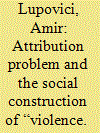

|
|
|
|
|
| Summary/Abstract |
Many scholars suggest that the difficulty of attaining cyber deterrence is due to the intrinsic characteristics of cyberspace. While this article does not aim to entirely refute this assertion, it suggests that the failure to successfully employ cyber deterrence is not determined by the technical challenges of cyberspace, but rather that the effects of these challenges are mediated through social context(s) and norms. To present this, I elaborate on the meaning of cyber deterrence and suggest that a rethinking of this term allows us to better address the various actors involved in the practices of cyber deterrence, as well as to better describe the intersections between the cyber and kinetic means affecting these practices. Building on the concept of cyber deterrence and borrowing from the constructivist approach to International Relations, I focus on how anonymity and “violence” are affected by social constructions and norms and in turn influence the success or failure of cyber deterrence. I briefly illustrate these assertions and their importance with regard to the case of Stuxnet.
|
|
|
|
|
|
|
|
|
|
|
|
|
|
|
|
| 2 |
ID:
169262
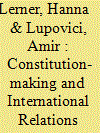

|
|
|
|
|
| Summary/Abstract |
Constitution-making has become an intrinsic component of international politics, nevertheless, international relations scholars largely refrain from theorizing it tending to view formal constitutional drafting as a domestic project. The article proposes an understanding of constitution-making as an international (in addition to national) political phenomenon. We develop a new and comprehensive classification of international influences on constitution-making. We also demonstrate how the empirical study of constitution-making can illuminate overlooked areas of research and challenge existing international relations theories. Our focus here is on the study of international norms. We present three theoretical insights concerning the emergence of international norms, their dissemination, and the role of epistemic communities in facilitating their expansion. We conclude by highlighting how the interaction between international and domestic factors in the crafting of constitutions further challenges the disciplinary distinction between domestic and international politics.
|
|
|
|
|
|
|
|
|
|
|
|
|
|
|
|
| 3 |
ID:
086453
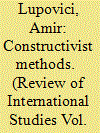

|
|
|
|
|
| Publication |
2009.
|
| Summary/Abstract |
My aim in this article is to improve the methodology of the modernist constructivist approach and to provide a more coherent, rigid, and systematic constructivist framework for research. I do this by combining the methods of process tracing, discourse analysis, and counterfactuals. In addition, I aim to provide clearer methodological criteria for the evaluation of constructivist research by modifying some of the positivist criteria and adding the criterion of contextual validity. I assert that a more coherent methodology will strengthen and improve constructivist study and may contribute to better communication between constructivist and positivist scholars.
|
|
|
|
|
|
|
|
|
|
|
|
|
|
|
|
| 4 |
ID:
192534
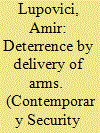

|
|
|
|
|
| Summary/Abstract |
During the course of the war in Ukraine, various actors have employed a unique type of deterrence by denial: namely, the threat to deliver arms. NATO leaders have committed—through rhetoric and deeds—to continue to deliver weapons to Ukraine if Russia escalated the war in order to deny Russian success. Not only is this type of strategy undertheorized, but it also challenges the distinction between direct and extended deterrence that has been central to deterrence scholarship. In deterrence by delivery of arms, the patron deters not by threatening to fight or deploy forces, but by committing to send weapons. However, the strategy also requires the protégé’s ability to fight. Studying deterrence by delivery of arms opens up understudied areas of deterrence (by denial), and provides a useful opportunity to consider how prominent concepts contribute to the research but also at times limit it.
|
|
|
|
|
|
|
|
|
|
|
|
|
|
|
|
| 5 |
ID:
179276
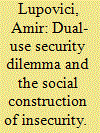

|
|
|
|
|
| Summary/Abstract |
In this article I introduce the concept of the “dual-use security dilemma,” specifically through elaborating on two main aspects that shape this dilemma. First, inspired by traditional security scholarship, I focus on the spiral dynamics of actors responding to the insecurities raised by dual-use technologies that affect this type of dilemma. Second, I further develop a securitization reading of the traditional security dilemma, tracing how social constructions of insecurities and the justification of extraordinary measures affect the dynamics of the security dilemma. Combining these two aspects, I suggest that enunciators shape the dynamics of the dual-use security dilemma by using specific rationales of insecurity to mobilize support for measures against opponents holding dual-use technologies, whose response further fuels insecurity that spirals over time. The innovative theoretical and policy implications of this research become especially important given the rise of dual-use cyber technologies.
|
|
|
|
|
|
|
|
|
|
|
|
|
|
|
|
| 6 |
ID:
099107
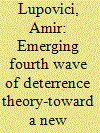

|
|
|
|
|
| Publication |
2010.
|
| Summary/Abstract |
In this paper, I aim to review recent empirical and theoretical developments in the study of deterrence. I suggest that an emerging wave of literature currently represents a revival in this field. However, unlike the previous waves, in which theoretical and empirical questions were studied together (realism and nuclear deterrence), in the emerging deterrence literature these two are isolated from each other. The theoretical trend of this wave is evident in new constructivist and interpretative scholarship that explores the practices of deterrence and has provided significant insights, chiefly with regard to classical empirical questions of state versus state and nuclear deterrence. The empirical trend of this wave can be seen through the work of scholars who are considering how to deter "new" threats-such as terrorism, rogue states, and ethnic conflicts-mainly by incorporating the traditional realist approach to deterrence. By reviewing these two trends in the current wave of deterrence writing, I demonstrate the advantages of each and suggest that the study of deterrence may benefit from their integration.
|
|
|
|
|
|
|
|
|
|
|
|
|
|
|
|
| 7 |
ID:
134493
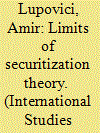

|
|
|
|
|
| Summary/Abstract |
Most discussions concerning how to evaluate theories make reference to empirical, methodological, logical, or normative criticisms. Less attention is given to how challenges in the theory itself affect the choice of cases. In this paper, I put forward the concept of observational criticism, which aims to trace biases in the empirical employment of a theory. While it overlaps with some of the criticisms mentioned above, observational criticism distinctly focuses on what we can learn about a theory through the prominence or absence of cases, or types of case, in the scholarship. To this end, I suggest a three-stage approach for this criticism and I demonstrate each of these stages, as well as the utility of this framework, through a consideration of securitization scholarship—and more specifically of how securitization studies have overlooked the case of securitization moves in Israel. I suggest that although the concept of securitization has generated a great many studies on various theoretical and empirical issues, and despite the prominence of security discourse and practices in Israel, securitization scholarship has tended to avoid studying the securitization processes of this country. Following this mode of criticism, I argue that securitization theory could be more easily implemented in the case of Israel by, among other things, further clarifying the meaning of securitization success and its duration.
|
|
|
|
|
|
|
|
|
|
|
|
|
|
|
|
| 8 |
ID:
123136
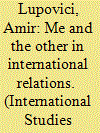

|
|
|
|
|
| Publication |
2013.
|
| Summary/Abstract |
A gap is currently growing between the rich theories in International Relations (IR) and how they are presented in classrooms. Although the scholarly literature acknowledges the complexities of international relations, these notions are not fully integrated into IR courses, especially at the introductory level. I assert that teaching IR through the framework of relations between different me(s) and other(s) would address this problem. In short, I claim that international relations are almost by definition about interactions between a me and an other. Acknowledging this fact will allow us to sharpen a number of important issues and questions in world politics concerning the me(s) (for example, states, ethnic groups, IGOs, NGOs, transnational communities) and their relevant other(s). I contend that this approach helps to capture the multiplicity of actors, interactions, and practices in IR, and to better connect them to the theories in the field. I further suggest that this approach not only provides a fruitful method for teaching IR, but it also allows scholars (and students) to rethink and reflect on the field.
|
|
|
|
|
|
|
|
|
|
|
|
|
|
|
|
| 9 |
ID:
117202
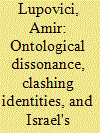

|
|
|
|
|
| Publication |
2012.
|
| Summary/Abstract |
This article further conceptualises and empirically tests the concept of ontological security. This concept, which refers to an actor's need to have a secure identity, has been used in International Relations (IR) mainly to study situations in which states face a threat to one of their identities. However, my focus here is on situations in which states are facing threats to a number of identities they hold, situations that result in what I term ontological dissonance. In such cases, not only are various distinct identities threatened, but the solutions to ease these threats are contradictory, forcing the state to choose between different cherished values. I contend that in such situations avoidance can become an attractive option for states in dealing with the difficulties arising from this dilemma. This theoretical framework is used to explain Israel's unilateral steps toward the Palestinians in recent years. I argue that the terror attacks of the Second Intifada (2000-2005) represented more than a physical security threat to Israel. The attacks and Israel's initial response to them aggravated threats to a number of Israel's identities and, more importantly, emphasised existing and potential future clashes among these identities. As a result, Israeli policy makers advanced unilateral steps to reduce these threats and to ease the accompanying ontological dissonance. These unilateral measures can thus be understood as measures of avoidance, and as such they complicated further cooperation between the Israelis and the Palestinians.
|
|
|
|
|
|
|
|
|
|
|
|
|
|
|
|
| 10 |
ID:
165443
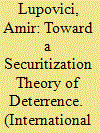

|
|
|
|
|
| Summary/Abstract |
This note incorporates securitization scholarship into the study of deterrence. I argue that deterrence is a securitizing move, and it is embedded in and affected by a broader assemblage of securitizing moves performed by different actors. These include the deterrer, the putative challenger, and various third parties. Linking deterrence theory and securitization theory opens up promising directions for theory and research. Among other things, it provides a way for interpretative scholars to engage with debates within traditional deterrence scholarship—such as those regarding deterrence success, deterrence credibility, and the effects of the use of force on these dynamics. It also highlights often-overlooked issues in the study of deterrence. These include processes through which actors come to adopt this strategy. It also includes processes through which the threat to deterrence itself becomes a powerful political tool for mobilizing support to different strategic moves.
|
|
|
|
|
|
|
|
|
|
|
|
|
|
|
|
|
|
|
|
|